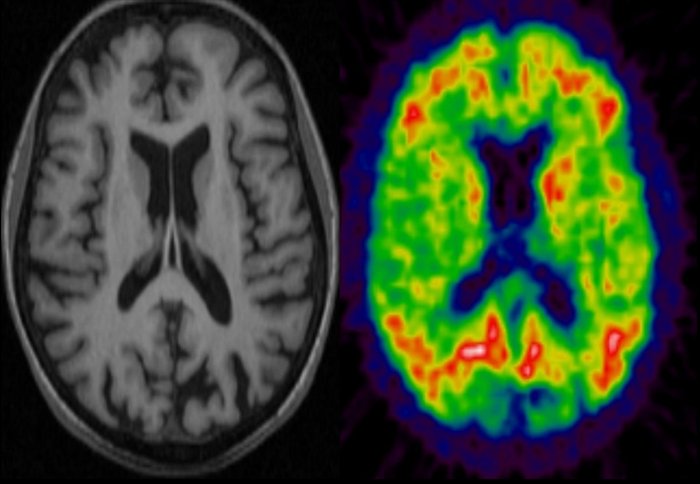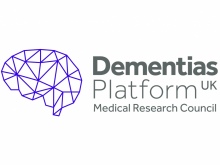MRI-PET scanner will enable new insights into dementia

MRI and PET scans of patient with dementia Credit: Dr Paul Edison, Neurology Imaging Unit
Imperial will install a new MRI-PET scanner in collaboration with Imanova, as part of the Medical Research Council (MRC) Dementias Platform UK (DPUK).
The installation marks the start of a concerted effort across seven UK clinical academic research sites to bring benefits of this new technology to doctors studying dementia and to their patients.
There are currently only two MRI-PET scanners in the UK. The new scanner will have the potential to increase understanding of the causes and progression of the disease, as well as providing a new way of evaluating the effects of new treatments. The unique potential to link information about molecular changes believed to be responsible for the disease with the brain changes that they cause will accelerate efforts to answer major questions that surround dementia and help define new paths to treatment.
By using MRI-PET scanners in a co-ordinated and harmonised way across institutes, we will all contribute massively to understanding and potentially treating dementia
– Professor Paul Matthews
Edmond and Lily Safra Chair
The technology combines scans from Magnetic Resonance Imaging (MRI) and Positron Electron Tomography (PET). MRI uses strong magnetic fields and radiowaves to deliver images that show the structure and anatomy of the brain. PET scans trace small doses of radioactive chemicals that have been injected into the body, to reveal changes in blood flow and oxygen use and changes at a cellular level to provide data on how the brain is functioning.
By combining these assessments of form (MRI) and function (PET), the new scanner will be able to provide a real-time comprehensive diagnostic picture in one scan.
The scanner will be installed within the Imanova facility in the Burlington Danes building on the Hammersmith campus of Imperial College London. It will be one of five new MRI-PET scanners that have been funded as part of the MRC’s Dementias Platform UK (DPUK) award for clinical research infrastructure. The announcement of the funding awards came the week before the DPUK inaugural conference held today (28 October) at The Royal Society.
“We still don’t really understand the disease and this is why there are currently no viable treatments,” said Professor Paul Matthews, chair of the DPUK Imaging Network and Edmond and Lily Safra Chair in Translational Neuroscience and Therapeutics at Imperial College London. “It is increasingly recognised that the key to future treatments for dementia is identifying the early risk factors and biomarkers - and this can only be done by studying large samples before the onset of dementia. This relies heavily on data from scans.
“Researchers at Imperial and from other institutes in the DPUK network will be using this advanced technology to develop an innovative new tool to investigate the brain. The MRI-PET scanner is still a very new technology so part of the work will be optimising the scanner and developing the technology with a focus on dementia. By using MRI-PET scanners in a co-ordinated and harmonised way across institutes, we will all contribute massively to understanding and potentially treating dementia.”
 The MRC DPUK is a public-private partnership that brings together top academic knowledge and cutting-edge technologies to pool data and expertise to improve dementia research. Alongside Imperial, the other recipients are the University of Edinburgh, Newcastle University, the University of Cambridge and the University of Manchester. Cardiff University has been awarded funding for a new MRI scanner. These six institutions make up the DPUK Imaging Network, which will use new technology to support experimental medicine and clinical trials in dementia research.
The MRC DPUK is a public-private partnership that brings together top academic knowledge and cutting-edge technologies to pool data and expertise to improve dementia research. Alongside Imperial, the other recipients are the University of Edinburgh, Newcastle University, the University of Cambridge and the University of Manchester. Cardiff University has been awarded funding for a new MRI scanner. These six institutions make up the DPUK Imaging Network, which will use new technology to support experimental medicine and clinical trials in dementia research.
The few MRI-PET scanners that already exist have mainly been used to scan cancer patients, but the priority for these new DPUK Imaging Network scanners will be dementia research. The network intends to harmonise scanning protocols in each institute, allowing data to be pooled to increase sample size and the power of data analysis.
The Imperial College London bid for the award was developed as a collaboration with Imanova Limited, a world leading centre of imaging sciences that is an innovative alliance between the MRC and three of London’s leading Higher Education Institutes: Imperial College London, King’s College London and University College London. The award will provide £5.6 million to install a state-of-the-art MRI-PET scanner together with specialised radiochemical equipment which will allow distribution of novel PET tracers to other centres in the network.
Kevin Cox, CEO of Imanova, said: “We are delighted to be collaborating with Imperial on this novel initiative. The combination of Imperial’s clinical expertise and our knowledge of imaging will ensure the DPUK get full value out of this investment, providing a real opportunity to advance treatments for dementia.”
Minister for Life Sciences, George Freeman said: “Infrastructure projects for clinical research are vital if we are to better understand diseases such as dementia and develop new treatments for patients. The new MRI scanner at Imperial College London is a great addition to our world class research capabilities and will help to keep the UK at the forefront of innovations in life sciences.”
For more information on the DPUK see http://www.mrc.ac.uk/research/facilities/dementias-research-platform/
Article supporters
Article text (excluding photos or graphics) © Imperial College London.
Photos and graphics subject to third party copyright used with permission or © Imperial College London.
Reporter
Franca Davenport
Communications and Public Affairs